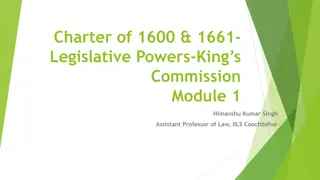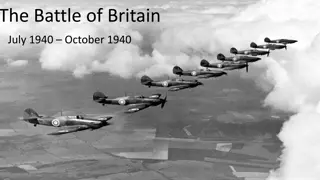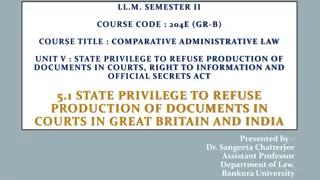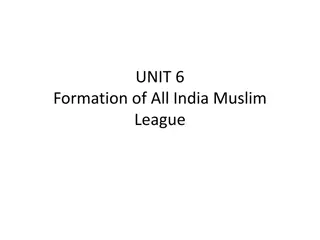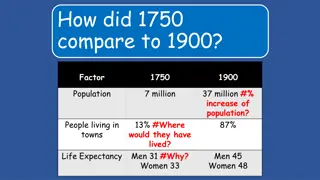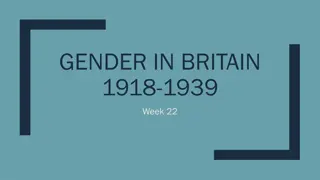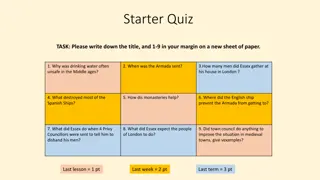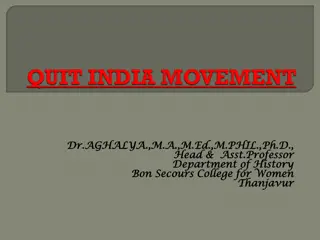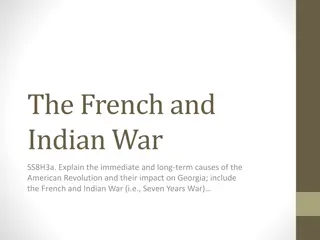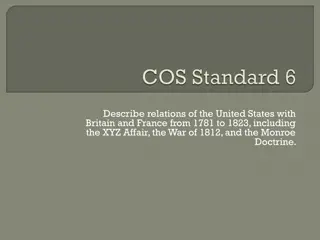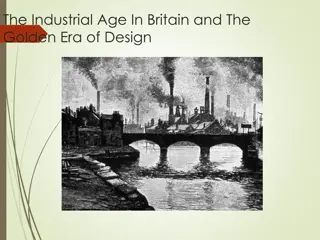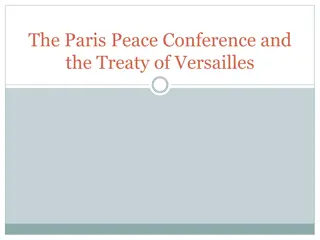The Changing Relationship Between Britain and India (1600-1800)
Britain's relationship with India underwent significant transformations from 1600 to 1800. The East India Company faced challenges initially but eventually gained power through strategic battles and alliances with local rulers. The Battle of Plassey in 1757 marked a turning point, leading to British dominance in India. Despite controversies and corruption, this period laid the foundation for the British Empire in India.
Download Presentation

Please find below an Image/Link to download the presentation.
The content on the website is provided AS IS for your information and personal use only. It may not be sold, licensed, or shared on other websites without obtaining consent from the author. Download presentation by click this link. If you encounter any issues during the download, it is possible that the publisher has removed the file from their server.
E N D
Presentation Transcript
How far and how fast did Britain s relationship with India change in 1600-1800? Mughal India What s happening? What s happening? 1756 - 1800 Ext. change: Speed change: Road metaphor? What s happening? Ext. change: Speed change: Road metaphor? 1608 Ext. change: Direction of change: Speed of change: Road metaphor? 1756 What s happening? What s happening? Ext. change: Speed change: Direction of change: Road metaphor? 1612 - 1707 Ext. change: Direction of change: Speed of change: Road metaphor? 1751 -55 What s happening? What s happening? Ext. change: Direction of change: Road metaphor? Ext. change: Direction of change: Speed of change: Road metaphor? 1751 Arcot 1707
In 1498, Vasco da Gama had discovered a sea route from Europe to India. In 1600, a group of Tudor merchants started an organisation called the East India Company (EIC), which was given a Royal Charter by Queen Elizabeth. They wanted to trade with India to make themselves rich. Yet their first ship to sail to India in 1608 didn t return the silks, spices and jewels they were hoping for. Portuguese traders saw the EIC as rivals and turned murderous, whilst the Mughal emperor refused to grant the British special trading rights. Despite this inauspicious (meaning unpromising ) start, within 100 years, massive fortunes were being made. Later Mughal emperors were more interested in setting up trade, and allowed the EIC to build factories in India. Soon, the EIC had bases at Madras, Bombay (now Mumbai) and Calcutta, from which they traded. They won huge privileges, such as not having to pay tax on the Indian goods they bought to ship home. Although they established bases in India, at first the EIC was not interested in taking over any land. Yet, in 1707, the death of brave and powerful Mughal emperor Aurangzeb led to a power vacuum, (no longer a strong leader in charge). and wars broke out between rival princes. French traders helped princes to win battles in exchange for trading rights. Unless the EIC did something, they would be squeezed out of India. British trade in India seemed to be doomed the Indian princes who had French support were on the verge of complete victory. Then a man called Robert Clive entered the story. Just a few years before, he had been so bored with his office work for the East India Company that he had tried to commit suicide, but his gun failed to fire twice! Then he joined the company s army, and captured an important city called Arcot with only 500 soldiers against a French and Indian army of 10,000 men!
Clives victory gave the British time to recover. Over the next four years, French power in India collapsed. The EIC became the most favoured trading partner. Then, in 1756, a prince (called a nawab ) named Siraj ud Dowlah, from Bengal, attacked the EIC s base in Calcutta. He didn t like the British having so many rights in India. The attack is known as the Black Hole of Calcutta : it was reported that 123 British men were smothered in a dark, tiny room. Clive was sent out again to India to teach the nawab a lesson. Clive met Siraj ud Dowlah at the Battle of Plassey. Clive s 3,000 men were victorious against the nawab s 60,000, because of Clive s well-trained troops, modern weapons, and the weather: a violent rainstorm soaked the nawab s ammunition supplies. The Battle of Plassey changed the history of the world. Clive made sure that Mir Jafar became the new ruler of Bengal, but it was the EIC who now held the real power over this rich area. This was the start of the British Empire in India, and over the next twenty years, the EIC took over all tax collection in Bengal. Clive became very rich, mainly through the use of bribery, deceit and threats. In Britain, the public were ashamed. In 1772, Clive was put on trial for corruption. Although he was not found guilty, his reputation never recovered. He became depressed, took drugs, and killed himself in 1774. Meanwhile, Clive s victory at Plassey encouraged more and more British traders, soldiers and officials to settle in India. To begin with, British-Indian relations were peaceful they traded, made treaties, and married each other.
In 1498, Vasco da Gama had discovered a new sea route from Europe to India. In 1600, a group of Tudor merchants started an organisation called the East India Company (EIC), which was given a Royal Charter by Queen Elizabeth. They wanted to trade with India to make themselves rich. Yet their first ship to sail to India in 1608 didn t return the silks, spices and jewels they were hoping for. Portuguese traders saw the EIC as rivals and turned murderous, whilst the Mughal emperor refused to grant the British special trading rights. Despite this inauspicious (meaning unpromising ) start, within 100 years, massive fortunes were being made. Later Mughal emperors were more interested in setting up trade, and allowed the EIC to build factories in India. Soon, the EIC had bases at Madras, Bombay (now Mumbai) and Calcutta, from which they traded. They won huge privileges, such as not having to pay tax on the Indian goods they bought to ship home. Although they established bases in India, at first the EIC was not interested in taking over any land. Yet, in 1707, the death of the Mughal emperor Aurangzeb led to a power vacuum, (meaning, there was no longer a strong leader in charge) and wars broke out between rival princes. French traders helped princes to win battles in exchange for trading rights. Unless the EIC did something, they would be squeezed out of India. British trade in India seemed to be doomed the Indian princes who had French support were on the verge of complete victory. Then a man called Robert Clive entered the story. Just a few years before, he had been so bored with his office work for the East India Company that he had tried to commit suicide, but his gun failed to fire twice! Then he joined the company s army, and captured an important city called Arcot with only 500 soldiers against a French and Indian army of 10,000 men! Clive s victory gave the British time to recover. Over the next four years, French power in India collapsed. The EIC became the most favoured trading partner. Then, in 1756, a prince (called a nawab ) named Siraj ud Dowlah, from Bengal, attacked the EIC s base in Calcutta. He didn t like the British having so many rights in India. The attack is known as the Black Hole of Calcutta : it was reported that 123 British men were smothered in a dark, tiny room. Clive was sent out again to India to teach the nawab a lesson. Clive met Siraj ud Dowlah at the Battle of Plassey. Clive s 3,000 men were victorious against the nawab s 60,000, because of Clive s well-trained troops, modern weapons, and the weather: a violent rainstorm soaked the nawab s ammunition supplies. The Battle of Plassey changed the history of the world. Clive made sure that Mir Jafar became the new ruler of Bengal, but it was the EIC who now held the real power over this rich area. This was the start of the British Empire in India, and over the next twenty years, the EIC took over all tax collection in Bengal. Clive became very rich, mainly through the use of bribery, deceit and threats. In Britain, the public were ashamed. In 1772, Clive was put on trial for corruption. Although he was not found guilty, his reputation never recovered. He became depressed, took drugs, and killed himself in 1774. Meanwhile, Clive s victory at Plassey encouraged more and more British traders, soldiers and officials to settle in India. To begin with, British-Indian relations were peaceful they traded, made treaties, and married each other.






